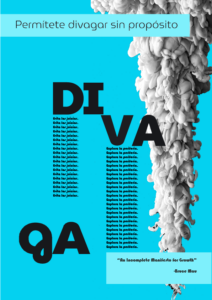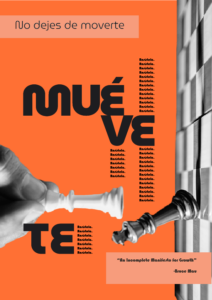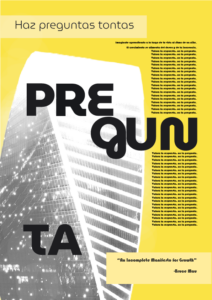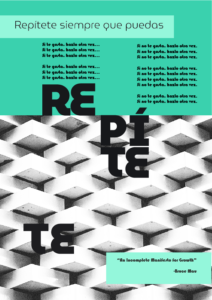Series# “An Incomplete Manifesto for Growth”
-Bruce Mau

| 08
Divaga
Divaga. Permítete divagar sin propósito. Explora la periferia. Evita los juicios. Deja la crítica para después.
“Un manifiesto incompleto para el crecimiento” de Bruce Mau_traducción de Juan López Vergara Newton y Sergio Ortiz.
Original | Drift. Allow yourself to wander aimlessly. Explore adjacencies. Lack judgment. Postpone criticism.

| 12
Muévete
No dejes de moverte. El mercado y su dinámica tienen la tendencia a reforzar el éxito. Resístelo. Permite que el fracaso y la capacidad de cambio sean parte de tu dinámica.
“Un manifiesto incompleto para el crecimiento” de Bruce Mau_traducción de Juan López Vergara Newton y Sergio Ortiz.
Original | Keep moving. The market and its operations have a tendency to reinforce success. Resist it. Allow failure and migration to be part of your practice.

| 15
Pregunta
Haz preguntas tontas. El crecimiento se alimenta del deseo y de la inocencia. Valora la respuesta, no la pregunta. Imagínate aprendiendo a lo largo de tu vida al ritmo de un niño.
“Un manifiesto incompleto para el crecimiento” de Bruce Mau_traducción de Juan López Vergara Newton y Sergio Ortiz.
Original | Ask stupid questions. Growth is fueled by desire and innocence. Assess the answer, not the question. Imagine learning throughout your life at the rate of an infant.

| 21
Repítete
Repítete. Si te gusta, hazlo otra vez. Si no te gusta, hazlo otra vez.
“Un manifiesto incompleto para el crecimiento” de Bruce Mau_traducción de Juan López Vergara Newton y Sergio Ortiz.
Original | Repeat yourself. If you like it, do it again. If you don’t like it, do it again.
“An Incomplete Manifesto for Growth”
These four points from “An Incomplete Manifesto for Growth”
emphasize the importance of freedom, curiosity, and repetition in the creative process.

They encourage drifting away from conventional paths and seeing failure as an essential part of growth, not a setback. Asking questions without judgment opens the door to new insights, while repetition—whether in success or failure—leads to mastery.
These principles urge placing the process above the outcome, creating space for learning and creativity in every step.